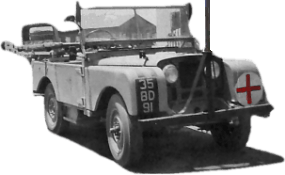
National Service in the Royal Army Medical Corps
Dr John A Lunn • Captain • RAMC • 1955-1957
In the Middle East and Cyprus

In World War 1 the British Army grew to 4 million, the greatest it has ever been. In World War 2, without the dreadful attrition of trench warfare, the Army was not as great, and at its height in 1945 was 2.9 million.

In the post war period tension with the USSR and defence of the Empire, apart from India which became independent in 1947, Britain still required a large army. In 1955, the year I began my National Service, the Army was a quarter of a million strong. A large contingent was stationed in Germany and much of the remainder scattered around the World in outposts of Empire. The RAMC had difficulty recruiting enough regular doctors and relied on National Service recruits. For this reason medical students were allowed to complete their training before doing their National Service.
I trained at St Mary's Hospital, Paddington and qualified in December 1953. I completed my two mandatory house appointments in December 1954, and was called up to do my National Service in the Royal Army Medical Corps (RAMC) in January 1955. My two years' service were completed in the second week of January 1957. St Mary's Hospital Medical School had given me an excellent medical training, but nothing had prepared me for some of the events which lay ahead of me in the Army.
There were just eight of us in my Army intake and we had to report to the RAMC training depot at Mytchett. The initial training lasted just six weeks before we were sent to our permanent postings. The training was, firstly, to learn the essentials of general Army routine, rudimentary drill and the importance and principles of Army hygiene, especially in postings in hot climates abroad. The latter proved of great value in my future postings.
The regular Army NCOs who did our training were all extremely kind and tolerant of us especially as our drill standard did not exactly match that of regular troops. We all became good friends with them and we clubbed together at the end of the course to give them each a present. It had been a very happy six weeks and remarkably relaxing after the demands of the hospital house appointments. In the Army each day was organised for us and we didn't have to worry about what to do next!
At the end of the six weeks' period the eight of us in our intake had become good friends but after dispersing to our various postings we never saw or communicated with each other again. I often wonder what happened to them.
The Suez Canal Zone had been protected by British troops for many years, but a treaty agreement with the Egyptian government had resulted in 1955 being the last year of British occupation. My posting was however to Egypt at the British Military Hospital, Fayid, which was approximately 50 miles along the Suez Canal.